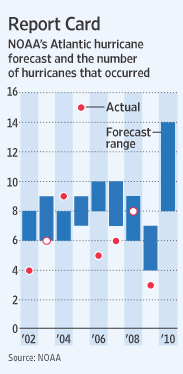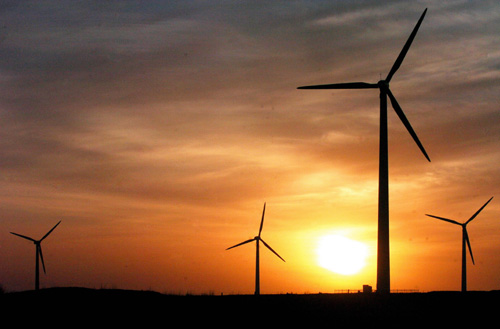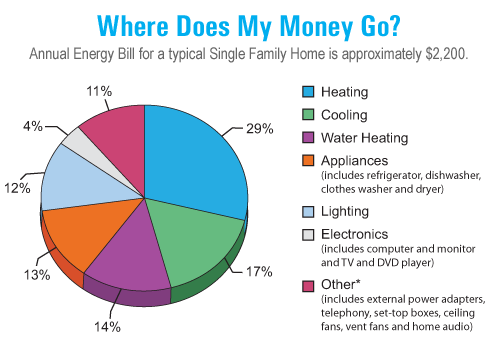 Jennifer Levitz, of the Wall Street Journal, wrote an interesting statistical review of US hurricane forecasting this past Friday. We’re still three months away from hurricane season but the take-away is that we should prepare for the worse. The review included this report card showing the range of prediction (note how the range has been getting a little wider each year since 2006), and the actual number of hurricane’s occurring in a given year.
Jennifer Levitz, of the Wall Street Journal, wrote an interesting statistical review of US hurricane forecasting this past Friday. We’re still three months away from hurricane season but the take-away is that we should prepare for the worse. The review included this report card showing the range of prediction (note how the range has been getting a little wider each year since 2006), and the actual number of hurricane’s occurring in a given year.
And this year, the National Oceanic and Atmospheric Administration is projecting a 70% probability of between 14 and 23 named storms this season with 8 to 14 actually being large enough to be called hurricanes which requires 74 mph winds (the blue bar on the right of the report card).
The seasonal average is 11 named storms and six hurricanes.
The performance for this predictive system is actually very poor. Only 20% of the time, the number of hurricanes has actually fallen within the predicted range, while 40% of the time the number of hurricanes is less than the range predicted. I’m concerned about the prediction quality and what it’s doing to the attitude of folks in hurricane-affected areas.
What happens when the NOAA predicts too many hurricanes?
40% of the time, this is the case. The higher prediction generates news. People think that global warming is happening, when there’s no evidence that it is other than the factors cited in the algorithm predicting the number of hurricanes.
The scientists in the NOAA hope that people and agencies in the Southeastern US respond with better planning for the potential disaster. Lumber retailers and bottled water retailers stock up on sheets and jugs.
But, when the number is actually less, there is inventory left on the retailer’s shelves, the NOAA loses credibility, and the people discount any future shouts of Prepare! Prepare! even if they are wholly justified and the people should Prepare! Prepare! This is the conditioning told in the fable of the little boy who cried wolf once too many times; people begin to ignore the news about the hurricane estimates, and ignore the shouts of preparation until it is too late.
What happens when the NOAA predicts too few hurricanes?
20% of the time this is the case. News outlets see happy news in the reduction, and don’t publicize it as much as the ‘man bites dog’ equivalent of an outrageous number of hurricanes. So, with the reduced chatter in the environment about hurricanes and hurricane preparations, retailers don’t respond and the people don’t respond.
What are the risks and costs of each? The under-prediction creates the least amount of preparation today, while the over-prediction generates the greatest amount of preparation today, but the greatest amount of lost credibility tomorrow. It would seem to me that the NOAA ought to build in a bias for their prediction estimates to UNDER estimate the number of hurricanes.











